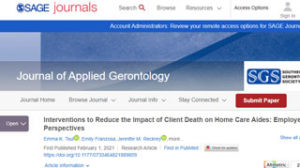
Interventions to Reduce the Impact of Client Death on Home Care Aides
Research demonstrates that client death can cause grief and job insecurity for home care aides, according to a recent article in the Journal of Applied Gerontology. After conducting interviews with leaders of eight New York City home care agencies, the authors concluded that agencies engaged primarily in a range of informal, reactive practices, and relatively few targeted and proactive efforts, to support aides around client death.
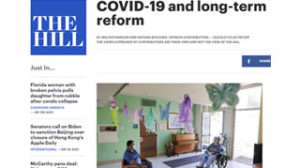
COVID-19 and Long-Term Care Reform
Despite the unprecedented challenges facing the Biden administration and the new Congress, comprehensive long-term care reform must be at the top of the policy agenda, write Walter Dawson and Nathan Boucher in The Hill. “Our collective COVID-19 response offers a sobering opportunity for real social change,” the authors suggest. “We can create and invest in a long-term care system that truly works.”
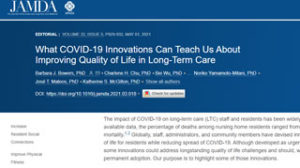
What COVID-19 Innovations Can Teach Us About Improving Quality of Life in Long-Term Care
Staff, administrators, and community members around the world have a lot of teach us about maintaining quality of life for nursing home residents while reducing spread of COVID-19, according to a JAMDA editorial penned by Barbara J. Bowers and colleagues. The authors share 19 interventions to increase resident social interactions, improve physical fitness, support staff-resident relationships, and promote family-staff communication.
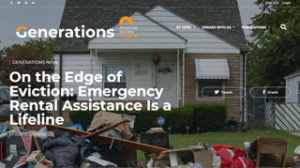
On the Edge of Eviction: Emergency Rental Assistance is a Lifeline
Many newly vaccinated older adults are slowly emerging from the grip of COVID-19, while others are still living under the pandemic’s dark economic cloud, according to a recent blog published by Generations. Blog author Alisha Sanders, director of housing policy research at the LeadingAge LTSS Center @UMass Boston, shares disturbing statistics to illustrate the precarious position in which older renters find themselves, and predicts that the situation will grow even more dire when bans on evictions expire.

What to Know About Caring for a Loved One from Afar
During a recent interview with Guideposts, Verena Cimarolli, director of health services research and partnerships at the LTSS Center, discussed what makes long-distance caregiving so complex and what caregivers say about dealing with their challenges. Cimarolli based her comments on findings from a study she conducted with a team of researchers.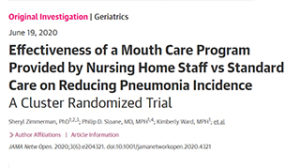
Mouth Care and Pneumonia in Nursing Homes
A pragmatic cluster randomized trial evaluated the effectiveness of Mouth Care Without a Battle, a standardized program that trains caregivers to provide mouth care to nursing home residents, including residents who are resistant or in special situations. The study, published in JAMA Network Open, found that the mouth care program was effective in reducing the incidence of pneumonia during the study’s first year.
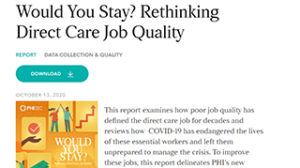
Rethinking Direct Care Job Quality
Would You Stay? Rethinking Direct Care Job Quality examines how poor job quality has defined the direct care job for decades. The PHI report reviews how COVID-19 has endangered the lives of direct care workers and left them unprepared to manage the pandemic. It also explores how quality training, fair compensation, quality supervision and support, respect and recognition, and real opportunity could help improve direct care jobs.

Integrating Family Members into Health Care Teams
Integrating family caregivers into a patient’s health care team can help improve care quality and quality of life for both patients and their families, according to a report from RAND Corporation. Yet, family caregivers face significant barriers when trying to coordinate their efforts with the formal health care team.
